Are you offering someone help but unsure whether “hope this helps” is the best thing to say? You might want to come across as slightly more confident or professional by using a different saying.
Well, this article will dive into what to say instead of “hope this helps.”
Other Ways to Say “Hope This Helps”
- I hope this information is useful
- Hope this works for you
- This should work
- This should help
- Do you need anything else from me?
- I hope this is everything
- I’m sure that’s enough
- Is that enough to help?
- Will that be enough?
- Does this help?
- If I can do anything else to help, let me know
- I hope you find this useful
- I hope that’s everything
KEY TAKEAWAYS
- “Hope this helps” works well in formal spoken contexts, but it isn’t useful in business emails.
- For formal emails, try using “I hope this information is useful” to sound more professional.
- “Hope this works for you” is a great informal alternative you can use conversationally.
There’s plenty more to say about these alternatives. Stick around to learn more about the most useful formal and informal options.
Also, if you came here to learn whether “hope this helps” is correct, you can skip to the final section! We’ve covered it in more detail at the end.
I Hope This Information Is Useful (Formal)
“I hope this information is useful” is a great formal alternative to “hope this helps.” It’s more concise and shows that you provided information to help someone.
You’ll have the most luck with this phrase as part of your email closing statement. That’s because it’s a good way to sign off an email that can replace “kind regards” or “best wishes.”
Generally, you’ll find yourself using it when emailing employees with updates or tasks. It shows you have provided information that you intend for them to use to their advantage.
In terms of formality, “I hope this information is useful” is much more potent than “hope this helps.” It’s more professional and shows you know what you’re talking about.
This email example will give you a better idea of how to use it:
Dear Patricia,
There are still a few ways we can sort this out. Most of them have been covered in the attachment below.
I hope this information is useful,
Derek
Hope This Works for You (Informal)
“Hope this works for you” is a great informal synonym for “hope this helps.” You may notice that there’s not much of a difference between the two phrases.
“Works for you” is a more conversational way of saying “helps.”
“Hope this works for you” is great when providing friends or family members with much-needed help. After all, it shows you’ve offered all the help you can and “hope” that it’s enough for someone.
You won’t generally use a phrase like “hope this works for you” in business emails. Just like “hope this helps,” it’s not all that effective when trying to convey a professional tone.
Here are some examples to help you more:
Well, I sure hope this works for you. I certainly don’t have any other ideas if this isn’t good enough!
I hope this works for you because I’m not able to stick around for much longer!
Is It Correct to Say “Hope This Helps”?
“Hope this helps” is correct in spoken English but does not work well in formal emails. You should avoid writing it in emails or business contexts because it is not the most professional choice.
There are quite a few ways you might come across it in spoken English. For instance, you might hear someone say:
- I hope this helps
- Hope that helps
- Hope it helps
All of these variations work well. “This,” “that,” and “it” all show that you’ve done something to try and help someone.
You may also find a difference in tense when using the phrase. For example:
- Correct: Hope this helps.
- Correct: Hope that helped.
- Incorrect: Hope it help.
“Helps” is the present tense. It implies you’ve just provided someone with help and hope it works for them.
“Helped” is the past tense. This suggests you provided help in the past and hoped that it worked out.
“Help” should never be used without the “s” at the end because of the pronoun choice (“this,” “that,” or “it”).
You can always return to this page if you’re still struggling between the different tenses. Use this article as a reminder to help you, and bookmark it for a later time!

